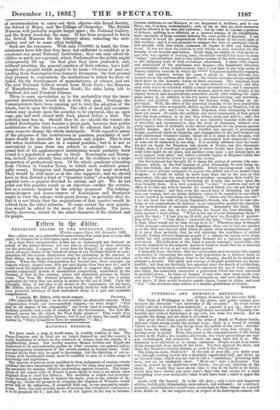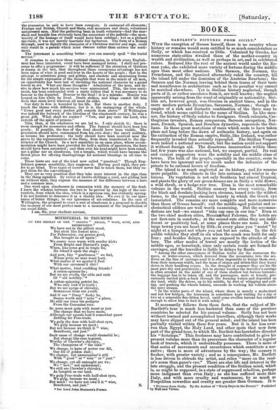FGNEBRIAL AND MEMORIAL 2STICETICS.
Ashton, Somerset, 1st December 1852. The Duke of Wellington is laid in his grave, and public opinion pro- nounces the obsequies " not unworthy of the occasion." An event occurs which calls for a national demonstration : a pageant is got up ; there is a lavish expenditure of money ; and—Englishmen are satiaed. England, con- fessedly and without hinderance of any sort., has done her utmost. Let us examine the thing, and see what it all comes to. The great Duke sinks quietly into the arms of Death at Walmer Castle. Autumn winds sweep round the ancient keep ; there is a sound of coming winter on the shore ; the flag droops from the middle of the mast; minute- guns boom the tidings. It is well. We could not keep him always; his passing away is grand. From this point to the commencement of the burial service in St. Paul's, two months afterwards, the whole proceedings are vul- gar, overcharged, and unnatural. Every one must have felt it so. The sensation is so universal as to escape comment. People. accept it as some- thing inseparable from shows of the kind. Yet'they applaud the show, and then, like Hamlet's worldly friends, go each to his own business. The lying-in-state, what is it.? At the risk of your life, you make your way through reeking crowds into a strangely caparisoned hall, and there, on an elevated stage, which you are told to call a " catafalque," glittering with stars, you see an unahapely chest. " Move on," says a policeman. You came in, nerved for an interview with Death; you go out, thinking of the Opera. Ah ! would they have shown him to you in his habit as he lived ; would they have shown you-your hero's face—the last enemy for a time triumphing over your invincible—that would have been a sight to appal the heart !
Again, with the funeral. It is the old story ; only a new and improved edition, double gilt, illuminated, embroidered, and ember ed. As a military spectacle, our Continental neighbours, accustomed to these things on a grand scale, deride it. In one respect only, in respect of italeterogeneousness, can
the procession be said to have been complete. It embraced all elements; Foreign and British; Church and State, real mourners and sham, volunteers and pressed men. Had the gathering been in truth voluntary—had the mar- shals and heralds less obviously been the concocters of the podrida—the spon- taneity of the homage of itself would have been sublime ; but as a plumed spectacle, it was not merely inartistic but barbarous. The form of a Boman triumph, used to dignify the 'obsequies of a' Christian warrior and sage, could only result in a parade which must obscure rather than enforce the senti- ment.
The interment is something better : you can scarcely spoil " the burial
service." •
It remains to say how these national obsequies, in which every English- man has been interested, could have been managed better. I shall not pre- sume to offer a programme: it will be sufficient if the attention of thinkers is drawn to the fact, that throughout these ceremonies advantage has not been taken of what is good and true in the hearts of the people ; that in the attempt to substitute pomp and glitter, and obsolete and unmeaning forms for the simple expression of the thoughts that were in the minds of all men, an opportunity has been lost of elevating the national character by a grand lesson in art. What are these thoughts ? Admiration of the man, and de- sire to show how much his services were appreciated. This, the true senti- ment, has been confounded with a misty notion that it was necessary to do honour to the departed. Honour to the dead ! it is a mistake. Honour was heaped on him while he lived. Death strikes, and kings cannot lift him from that stern level whereon all must lie alike.
Our duty to him is bounded by his life. But there is another duty. I touch the theme with diffidence, but it is the mainspring of the whole. "Every good and every perfect gift cometh from above." If Wellington was indeed the bulwark of the liberties of the nineteenth century, he was a great gift. What shall we render ? "Vow, and pay unto the Lord, who cutteth off the zpirit of,prinees."
This, then, is the conclusion we are led to. I only sketch it; there is room enough for accessories and effects. The funeral should have been less gaudy. If possible, the face of the dead should have been visible. The procession should have commenced from his own door; the escort military, as became his profession ; the body should have been received near the grave by the representatives of the State, from them transferred to the dig- nitaries of the Church. In a new sepulchre in an open place, where accom- modation might have been provided for half a million of spectators, the hero should have been,entombed ; and then over his head might have been raised, not a pillar nor an almshouse but a temple, which would have become the fittest place for offering thanksgivings for national blessings in all time to come.
- These hints are not of the kind now called "practical." Though Eng- lishmen possess sensibility, they suppress it. Having good sight, they pre- fer to go blind. True types of sorrow never fail to touch them, but they re- ject them for the conventienal.
They are so very practical that they take more interest in the sign than in the thing signified. By velvet at twelve shillings a yard, and gilding laid on without stint, they express the measure of the difference between a hero and a common man.
One word upon almshouses in connexion with the memory. of the dead. I leave the relation between the two to be proved by the logic of the con- venticle, from which the idea, which is arspecious one, has evidently sprung. I do not hesitate to denounce it as a shabby idea. We owe it to our igno- rance of better things; to our ignorance of art-relations. In the case of Wellington, the proposal to erect a sort of almshouse is a proposal to shackle the memory of our most perfect man to a monument of the imperfection of our social fabric.



























 Previous page
Previous page